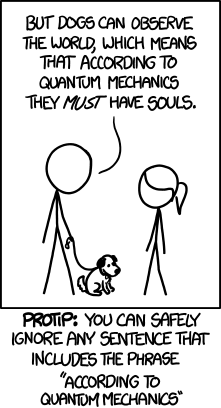Mathematical Quantum Theory

xkcd.com/1240 licensed under CC BY-NC 2.5
This course starts on October 15.
Content
The module provides an introduction to mathematical methods that play an essential role in the formulation and analysis of quantum theories. Topics include the Fourier transform, distributions, Hilbert spaces, unitary groups and their generators, spectral theory of self-adjacent operators, spectral theorem, tensor products, POVMs, spectral measures, and trace class operators. The mathematical methods are motivated from quantum theory and applied to examples from quantum theory.
Objectives
Students know and understand the terms and methods mentioned above and can use them to analyse known and new questions from quantum theory. They are able to understand and explain the statements and proofs of the lecture. Furthermore, they link physical problems and their mathematical modelling and are able to question the relevance and adequacy of mathematical modelling and the mathematical results derived from it. Through homework assignments and exercise classes students develop a confident, precise, and independent acquaintance with the notions, statements, and methods explained in the lectures. They learn how to transfer these methods to new problems, to analyse them and to develop solution strategies on their own and within a group. They are able to present their solutions and to stand for them in a critical discourse if necessary.
Registration
- Please sign up for the exercises on URM. You will submit your homework and receive marks electronically on URM.
- Please join the course on ILIAS. Lecture notes and more will be made available on ILIAS.
You can log on to both pages with your university account.
Homework Assignments
There will be weekly homework assignments. Students are strongly encouraged to collaborate while working on the problem sets. However, each student should write up and submit their own solution in order to get accurate feedback. You will submit your homework on URM (cf. registration). Solutions to the homework problem will be discussed in the weekly exercise class.
Discord
We have set up a Discord channel for this course. There students can discuss lectures and exercises among themselves and with the instructors. You find an invitation link for the Discord server on Ilias (access with ZDV login).
Exam
Students who have received at least 50% of the overall homework points throughout the term (see above) are admitted to the final written exam on Monday 10 February 2025, 10-12. The exam can also be (re)taken on Friday 11 April 2025, 10-12.
Live Streaming
The lectures will be streamed via Zoom for students not yet in Tübingen. You find the Zoom link in ILIAS.
Literature
In addition to the lecture notes, the following text books may be useful for (completely optional) further reading.
- M. Reed and B. Simon, Methods of Modern Mathematical Physics: I Functional Analysis, second edition, Academic Press, 1980
- M. Reed and B. Simon, Methods of Modern Mathematical Physics: II Fourier Analysis, Self Adjointness, Academic Press, 1975
- E.H. Lieb and M. Loss, Analysis, Graduate Studies in Mathematics 14, AMS, 2001
